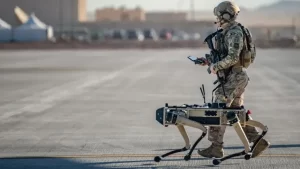By James Harris
As technology continues to evolve, the military landscape is undergoing a transformation driven by advancements in artificial intelligence (AI) and cybersecurity. The integration of these technologies presents both unprecedented opportunities and significant challenges for national defense. The explores the future implications of military AI and the threat of cyber attacks.

One of the most prominent applications of AI in the military is the development of autonomous systems, including drones and unmanned ground vehicles. These systems can perform surveillance, reconnaissance, and combat operations with minimal human intervention. The future will likely see an increase in their sophistication, enabling them to make real-time decisions based on complex data inputs, which could enhance operational efficiency and reduce risks to human soldiers. AI algorithms are increasingly being used to analyze vast amounts of data from various sources, enabling military leaders to make informed decisions more quickly. Predictive analytics can assess potential threats and recommend tactical responses, improving situational awareness and response times in dynamic environments. This capability could significantly shift the balance of power in conflict scenarios.
AI is also revolutionizing military training through realistic simulations that adapt to individual learning styles. Virtual environments powered by AI can create scenarios that challenge soldiers and improve their readiness for real-world situations. This personalized training can lead to better-prepared forces, capable of operating in complex and unpredictable environments.
As military systems become increasingly interconnected, the threat landscape is evolving. Cyber attacks can disrupt command and control systems, compromise sensitive data, and disable critical infrastructure. Adversaries are likely to employ AI to launch sophisticated cyber attacks, making it more challenging for traditional defense mechanisms to respond effectively.
On the offensive side, militaries are investing in AI to enhance their cyber defense capabilities. Machine learning algorithms can analyze network traffic in real time, identifying anomalies and potential threats faster than human operators. This proactive defense strategy aims to minimize vulnerabilities and strengthen cybersecurity posture.
The integration of AI in military operations raises ethical concerns. The potential for autonomous weapons systems to make life-and-death decisions without human oversight poses moral dilemmas. Additionally, the use of AI in cyber warfare could lead to escalation, with nations responding to attacks in unpredictable ways.
The future of military AI and cyber defense will likely involve international collaboration. Sharing intelligence and best practices among allied nations can create a more robust defense against common threats. The military must balance the pursuit of technological innovation with the need for security. As AI and cyber capabilities evolve, maintaining robust defenses against potential threats will be paramount. Investing in research and development will ensure that military forces remain at the forefront of technological advancements.
The future of military artificial intelligence and cyber attacks is poised to reshape global security dynamics. As nations harness the power of AI to enhance military capabilities and address cyber threats, they must also navigate the ethical and strategic challenges that accompany these technologies. Preparing for this evolving landscape will require cooperation, foresight, and a commitment to responsible innovation.

